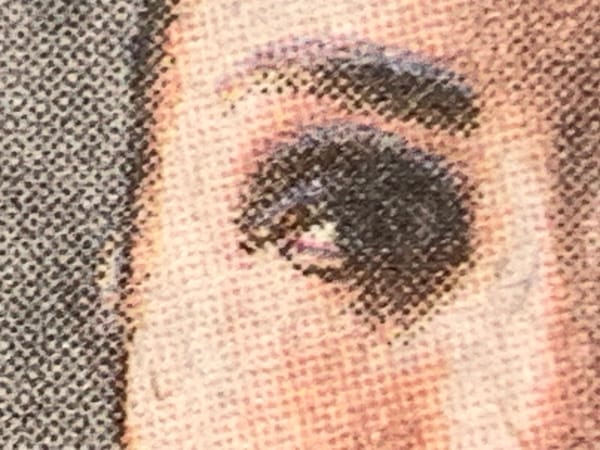The poop on mortality: a talk with Gene Weingarten
INDIGNITY VOL. 4, NO. 8

EXISTENTIAL DREAD DEP'T.
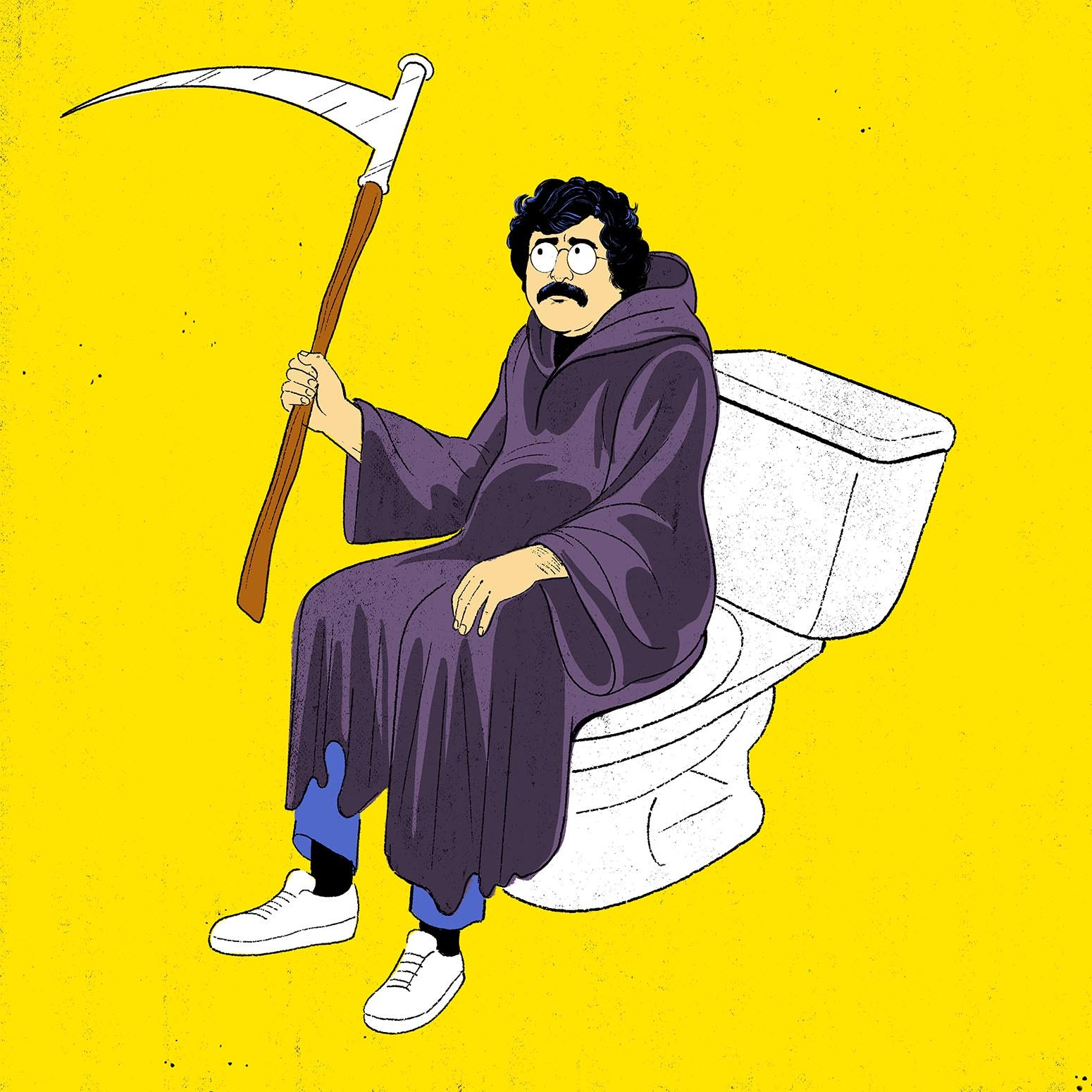
Dying Is Easy
GOOD MORNING! FOR many years now, I have maintained a mostly epistolary friendship with Gene Weingarten, who was the longtime humor columnist and a two-time Pulitzer Prize–winning feature writer for the Washington Post. We have met for lunch at least once, in the company of the late genius cartoonist Richard Thompson; Weingarten is physically incapable of recognizing or remembering faces, so for all he knows we have had lunch dozens of times since then, with me under an assumed name each time.
When Weingarten saw that I had suffered some serious health problems and written about the experience, he suggested we should collaborate on a discussion of bodily decrepitude. As a professional funny person, Weingarten is obsessed with suffering; his second Pulitzer was nothing short of a tour of Hell, a deeply reported, indelible, sympathetic account of how and why parents make the unendurable mistake of forgetting their small children in the car on fatally hot days. It's on the short list of stories that everyone, genuinely everyone, should read.
But ideally not right away. First, you get an old person talking to a middle-aged person about what it means to fall apart. Thanks to the brutal leveling power of time and the newspaper industry, Weingarten is now writing a newsletter called The Gene Pool, which will publish this item at the same time Indignity does.
Because this was Weingarten's idea, he wrote the formal introduction to it. Far be it from me to challenge a two-time Pulitzer winner's command of the facts, but I would say that his characterization of my original dispute with him does not quite track with my own recollection of what my argument was. This was before I had Gmail, though, so I don't have the old emails on file. Mostly I'm delighted to have learned, after all these years, that the whole reason he showed up in my inbox to challenge my view of him as a self-inflated journalistic big-timer was that he was following a Google Alert for his own name.
By Gene Weingarten, The Gene Pool
HERE IS HOW I met my friend Tom Scocca, exactly 20 years ago. One morning I fired up my computer and was immediately notified, by Google Alerts, that someone had written something about me. For a columnist, this is only sometimes good news. Warily as always, I clicked on the link, only to discover I was a slimeball. A columnist named Tom Scocca, writing about comic strips for City Paper, the alternative newspaper in Baltimore, noted in passing that he didn’t like me because of “something scummy” I had once done to a friend of his. I had never heard of Tom, had no idea who is friend was, and had no clue as to what the hell he was talking about. I reported this in my chat, calling him a “dork.”
Only then did I email him for an explanation. He told me that a feature article I had once written about a brain-dead girl in Worcester, Massachusetts—a girl in whose presence religious statuary was said to be weeping blood and tears—contained a several-paragraph section plagiarized in tone from his friend, Ellen Barry, who had written a story about the same girl in the Boston Phoenix a few months before. I was big-footing her, an established journo stealing an idea from a relative unknown.
I compared the two stories and saw no plagiarism or big-footing, but Tom stuck to his deeply incorrect contention, against overwhelming evidence to the contrary, with the stubbornness of a mule’s grandfather. Eventually I called Ms. Barry, who would go on to become a star international reporter for the New York Times, and she said she saw no foul, and that Tom was a complete maniac. (I made up that last clause—she didn’t say that—but he is.) Anyway, I later had lunch with Tom. He opined that the media—BUT NOT HE HIMSELF—was ridiculously sanctimonious in condemning alleged plagiarism; he said it was as though, suddenly, some bank robber starts indiscriminately blowing away tellers, and not even taking the money, and all the other bank robbers in town start shaking their heads, and saying, "What's the matter with THAT guy?" In short, Tom is a funny insane maniac who won’t back down, which is why we became good friends, almost immediately. Not long afterwards, he sent me this this haiku he had written about his beloved Orioles:
Grounded to Bill—
He flips to Cal for one,
To first—two!
I told him it was only okay, if a bit feeble, and then he explained to me, as to an idiot: “It’s a haiku, but it isn’t the classic 5-7-5 syllabic meter, but 4-6-3, which is the number of the second-to-short-to first double play in scorecard notation!” As though this should have been obvious to anyone. As I said, he is a funny, insane maniac. These days, Tom is a freelance journo, a media critic, and the writer and editor of an excellent Substack newsletter and podcast called Indignity, to which you should subscribe for reasons you will soon understand.
Just last week, I was shocked to see that Tom had written an extraordinary cover-length story in New York magazine about a medical maelstrom that had befallen him. I read it. I hadn’t known about it. It is a cascading descent into hell that is not over yet. I am filing a little early this Tuesday so you will have time to read it, if you have the fortitude, before we begin.
Gene Weingarten, for The Gene Pool: Are you game for an interview?
Tom Scocca, for Indignity: Sure.
The Gene Pool: First, I have to say your New York magazine story was scummy. Sorry, I just feel that way, and I’m not backing down.
Indignity: Acknowledged.
The Gene Pool: I want to make you feel better about things. Better by comparison. I am 72, 20 years older than you, and currently dealing once again with a periodic unexplained medical phenomenon. It generally lasts three days. My left knee, crafted from titanium and swaddled in aging muscle and ligament, starts barking so badly that I have to mince up and down stairs like a centenarian, literally at half speed, left foot then right foot on the same step. Repeat. Repeat. Sometimes I forget the foot that one must begin on to better avoid pain when going up and down stairs (they are the opposite feet), so I created a mnemonic device to help me remember —Right, Rising; Left, Lowering—but often forget the mnemonic because my short-term memory has shorted out.
Indignity: OK.
The Gene Pool: A typical event in my life: I will be writing something on my computer, then suddenly get a once-in-a-lifetime inspiration on a new topic. So I hit Control-T to open a new screen, but this single, reckless, inexcusable mechanical act of digression instantly wipes the new idea from my mind, sometimes forever. Because I often get writing ideas in my dreams, I have vowed to always keep a pen and notepad beside me in bed, but always forget. So when the idea comes and wakes me, I have to shuffle to the bathroom, babbling the idea out loud, as a mantra, so it doesn't run away during the 20-foot trip to the john. Then I write it down with soap on the bathroom mirror, just a few words to jog my memory. I often cannot interpret it the next morning, and it seldom returns.
I can still recite almost all of the uniform numbers of the 1960 Yankees and related trivia (Clete Boyer started the year as number 34 but then switched to number 6) but I am sitting here typing this and cannot remember the color of the underpants I put on a half hour ago. I believe they are black. Hang on, checking.
Red.
Lately my blood pressure has been pogo-sticking up and down for no apparent reason. I have described the phenomenon this way: They are numbers that might alternatively be achieved by a swimmer of the English Channel, and then, a little later, by a dying fat guy who had stroked out and is at the bottom of a swimming pool. No reason is medically evident.
One day a few years ago I began having trouble coming up with words, and I was un-drunk or otherwise chemically impaired. These were not fancy words that I could not recall. I told my girlfriend "I need to find that thing.” She: “What thing?” Me, exasperated by her denseness: “You know, that thing. The thing. It’s long. It’s food.” It turns out I had meant my eyeglasses.
Hospital. No solid diagnosis.
My point is, my friend, you’re doing fine, by comparison. Relax. At 52, you are still a child, with the world ahead of you, and all its possibilities.
Indignity: Seems like you should just transfer your old grudges and anxiety over decrepitudes to your puny short-term memory and let them evaporate. I was impressed that you could recall all these things going wrong with yourself, but then I remembered that you're a trained hypochondriac.
Keeping track of my own body's failings has been a real chore for me. Up until last year, my relationship with my physical existence and with medicine worked like this: One time, I stubbed one of my smaller toes really hard, so hard it swelled up and turned purple and black and stayed that way. I went to a doctor, and the doctor told me it could very well be fractured, but I'd need an X-ray to tell for sure. He also told me the treatment for a broken toe would basically be to just wait it out and try to walk around as normally as possible so it didn't heal weird. I walked as normally as possible to the elevator, carrying the referral to the downstairs X-ray place, rode straight past the X-ray floor to the lobby, and went on out. I had stuff to do. Soon enough, I forgot all about the toe.
I'm far from being any sort of stoic or tough guy. I just find it exhausting to think about your body as an endless warning system about what's wrong with your body. When I first developed middle-aged lumbar pain, my favorite treatment was to slap on one of those giant adhesive patches laced with capsicum—the principle behind it being to inflict pain across the whole area, so the specific pain nerves that had been complaining before got confused and shut up. It worked! I also endorse putting a pinch of salt directly onto a canker sore, which may or may not speed healing by killing germs, but which definitely causes a brief burst of searing pain, after which the previous pain level feels like sweet relief.
How could you stand paying attention to this stuff all the time?
The Gene Pool: I can’t. But for much of my life, I have had no choice. God has visited on me a plague called “somaticism,” which means I feel the goings-on in my body with greater clarity than most people: I feel my pulse. I feel food moving through the alimentary canal, and such. With the proper pessimistically neurotic mindset, which God also granted to me, this can be diabolical.
Once, when I was a young adult, I shifted weirdly in a chair, and felt a stabbing pain in my scrotum. Other men do this to themselves multiple times—trust me, ladies, physically, we are doofuses—and just ignore it. The dedicated hypochondriac cannot ignore such things. I suspected testicular cancer. So for weeks I became focused, minute after minute, on whether my crotch was hurting. Your entire being becomes a telemetry system—analyzing, computing, uploading to the brain. The expectation of pain fuels the sensation of pain. You start to walk a little oddly, to compensate, which awkwardly re-aligns your body, adding to the pain. Eventually, I went to a doctor, who examined my privates, took some tests, and then, oddly, asked me about my life. Taken aback, I unloaded: I said I was worried about my romantic relationship, and anxious about maybe losing my job, and that I felt I had no integrity, no ability, and no future. The doctor looked at me and delivered his diagnosis: “You are a young man. Enjoy your life.” And the pain went away.
But let’s not dwell on this disturbing subject. Let’s discuss Death.
I suspect you have recently become more acquainted with the world of this subject than you have ever been before (I have been a denizen since the age of 14).
I find myself thinking often about a Pulitzer Prize–winning book from 1973, The Denial of Death, by cultural anthropologist Ernest Becker. It makes the argument, quite disturbingly and persuasively, that Freud was mostly right, but erred in one of his basic conclusions: The human brain is not all about anxiety over sex, Becker said, but anxiety over the inevitability of death. We cope with this potentially paralyzing fear through denial. We busy ourselves with things that take our minds off the horror that awaits us all. We follow sports teams, take up cooking, get married, raise children, etc. Becker argues that the sanest of all of us might be the insane, who have succumbed to the horror of the truth that nothing means anything because we are doomed to die and be forgotten.
Nice, huh?
So, share your thoughts on this, with the benefit of your recent experience.
Indignity: Hmm. Before you get up off the couch, there, having established your lifelong awareness of the frailties of the psyche, let's consider the other message you sent me before that one, a personal one, apologizing for how late your response arrived, telling me you "feel bad" because you "like to meet deadlines." Dead-lines, you say. Our little recurring appointments with finality.
Do we really spend our lives on the run from death? What knocks me awake at night and keeps me there, lately, is life—the sheer scramble to keep up with what had seemed, before this, to be the steady and stable flow of days. This disease doesn't seem to be trying to kill me, at least not quickly. Barring misadventure, I still probably have another quarter-century of paying bills and counting out pills, trying to fend off entropy, like the unhappy moth in Norm Macdonald's joke, its misery rising to Tolstoyian torment, imagining itself a spider, "just barely hanging onto my web with everlasting fire underneath me."
And as my grip slips and the flames get closer, I've been struck by the insidious power of denial not about death but about everyday things. Before I got sick, I used to make sure to make the bed every day. I caught myself skipping it, and then I realized that in my mind, the gloss I was putting on this behavior was that making the bed was not as big a priority for me as it used to be. Horseshit! I was avoiding making the bed because the comforter is big and cumbersome and the muscles that used to give me leverage to flap it up and spread it around were now withered and feeble.
Once you catch yourself lying to yourself, you realize how easy it is. I just happened to develop a subtle shift in my clothes preferences, in which I wasn't as interested in wearing the pants in the very bottom of the closet rack, where I would have to bend my stiff and weakened hips to reach them. My work got a bit more absorbing—so absorbing that I didn't have time to get outside for a walk, especially with the days as short as they are. In truth, the back of my mind, where the decisions get made, was counting the flights of steps out the door and back again, and preferring not to go.
I'm not sure sports is much of an escape from the war of the self against the self. One thing I did a lot, my first week in the hospital, was watch playoff baseball; one thing I did not do, on my regimen of yogurt and pureed food and inactivity, was take a crap. By the seventh night, my beloved Baltimore Orioles—who'd won 101 games despite cheaping out on the pitching staff—were, as the expression goes, on the brink of elimination. They trailed the Texas Rangers two games to none in a best-of-five series, and were behind 3–0 in the bottom of the second inning, after a two-out, two-run double. And then I watched as Dean Kremer tried to get a fastball by Adolis Garcia and Garcia contemptuously swatted it 418 feet to left field on a high arc, admiring it as it went. It was 6–0 and there were still seven-plus innings to go. I clambered out of bed and wobbled off to the bathroom to spend the next few innings in grim, mostly futile combat against my own digestive tract. It was painful and disgusting, but it kept me from watching the game.
Does your obsessive scorekeeping of your body's failings keep you from falling into the trap of self-deception? Or when your knee starts barking, do you suddenly discover that one floor of your house contains everything you really need, and that venturing upstairs would really, if you think about it, be a waste of time?
The Gene Pool: The latter. In my case, it involves deciding that contrary to my prior opinion, the upstairs bathroom in my house is just as inviting in the mornings and evenings as the downstairs bathroom is. The one is two staircases away, but contains a high-tech bidet that cleanses your behind with a warm, surprisingly gentle firehose-nozzle of comfort, tranquility, and hygiene. (Tom, Please note that we both, instinctively, under pressure, have reverted to the easy, go-to male subject of the banal anal. )
Not to criticize your observational trenchancy vis a vis that of Ernest Becker, I would like to point out that when beset by mortal fear, you resorted to watching sports. Yes, the O’s collapsed like a souffle in an earthquake. But that was the point at which you … departed. You could not tolerate the knowledge of impending … death.
However, we are running out of time. Word-limits approach. We have to move this along into more profound and dignified realms.
Still, I have to tell you what happened to me this past Saturday. Because I am involved in a unwise, neurotic crash diet owing to my weight, which pogo-sticks up and down like my blood pressure but is more evident to outsiders (I am currently at my perigee, five nine-and-a-half tall and 188 pounds thick—but, judging from your photo in NYM, this sort of thing does not seem to be a particular problem for you, you scummy fuckstick), Rachel brought home some mercy candy for me. Specifically, it was a no-sugar version of Werther’s Original hard caramels. They were shockingly delicious. I overindulged and about two hours later was visited by something awful.
Later, after an hour of excretion, I looked up this particular confection online only to determine it is ridden with isomalt, a sugar substitute infamous for its scouring laxative effect, inducing a condition I call dire rear.” One online commenter, a woman, said it made you “uncontrollably pee out your poo hole,” which is an elegant and accurate use of language that I endorse.
Now we really have to approach those profound and dignified realms. In fewer than 100 words, please describe the principal philosophical realizations your recent medical travails have disclosed to you.
Indignity: I would remind you that the photo in New York magazine reflects my experience of losing 30 pounds in six months, the last 10 of which came off in two weeks in the hospital. In that sense, and only that one sense, I've recovered what it felt like to be 25 years old again.
Philosophically? We're all vulnerable, all the time. The sense of self that gets us through our days is as contingent and fragile as the workings of our bodily tissues are. Get a booster and wear a mask—for the sake of people like me, and because you're one turn of luck away from being people like me, too.
The Gene Pool: Whoa, I just now discovered that there’s a respected scientific report out there that reveals, through brain scans, that we might actually see our lives flash before our eyes in the moments before death overtakes us.
I’m not sure I’d look forward to that. I survive psychiatrically via the nimble manipulation of guilt and anxiety and self-loathing, and I think what might flash through my eyes is a litany of my most painful bathroom experiences.
One of my favorite topics is how humor is, at its heart, a means of taming the existential terrors of life: You have to either cry or laugh. Thanks for laughing with me.
Indignity: See you in Hell, eventually.

WEATHER REVIEWS

New York City, January 15, 2024
★★★★ Snow was on its way, heralded the way it used to be heralded: by a steadily graying sky on a fully freezing day. A mourning dove fluffed itself up, dull brown in harmony with the dullness overhead. The cross streets were strewn with salt, thick and ivory-pale in the spots where a truck had slowed or stopped for an intersection. The lightweight pants and t-shirt meant for exercise were no match for the bite of the cold. People were going about fully bundled, with hats pulled on tightly and scarves tucked into zipped-up coats. Evening was calm and frigid. An arm thrust hopefully out into the dark may or may not have felt the first tiny touch of a flurry. By bedtime the top of the balcony wall was white, and flakes were driffting slowly down through the streetlights.

EASY LISTENING DEP’T.
INDIGNITY MORNING PODCAST
Indignity Morning Podcast No. 197: The teens of Newark.
Tom Scocca • Jan 12, 2024
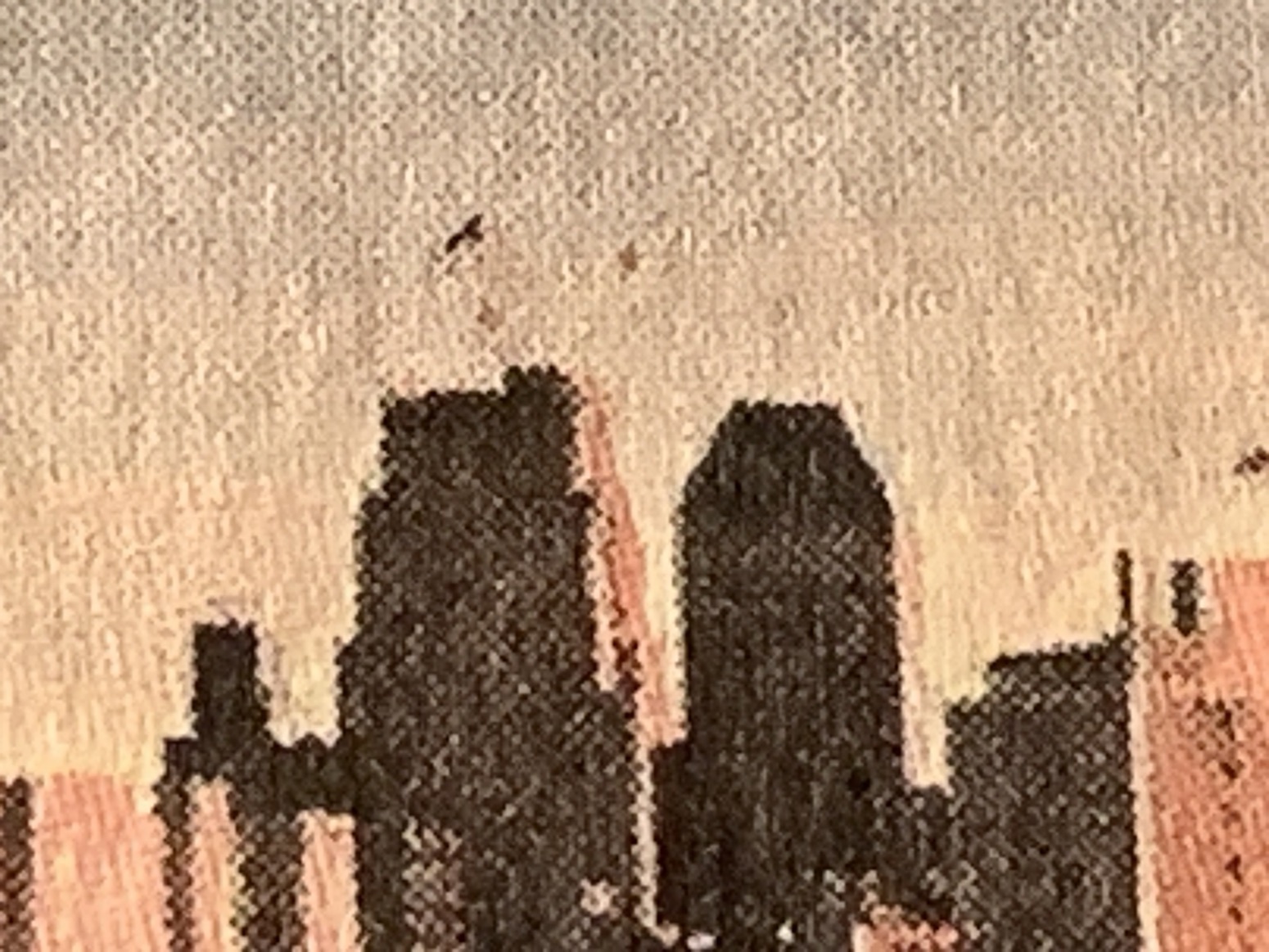

BLUESKY DEPARTMENT
READERS OF INDIGNITY who have previously benefited from the Bluesky-code generosity of other readers of Indignity are now daily paying it forward and providing us with even more codes for the still-beta social network. If you haven’t already gotten a code from us, we have lots of codes. Email indignity@indignity.net and we will award Bluesky codes to those who respond, one per reader, first email, first served.

SANDWICH RECIPES DEP’T.
WE PRESENT INSTRUCTIONS for the assembly of sandwiches from Aunt Sammy's Radio Recipes, developed by the Bureau of Home Economics, U.S. Department of Agriculture. Published in 1927, these recipes are now in the Public Domain and available at archive.org for the delectation of all.
Aunt Sammy's Radio Recipes is in no sense a complete cookbook. It is issued to meet the enormous demand for printed copies of the most popular recipes broadcast from October, 1926, to June, 1927, in the "Housekeepers' Chat" programs of the radio service, United States Department of Agriculture.
CHEESE SANDWICH FILLINGS
1. Mix equal quantities of Neufchatel or cream cheese with chopped olives, pimentos, and nuts, or any one or two of these. Add salt and a little onion juice, if liked. Spread on slices of white or graham bread.
2. Mix the cheese with finely chopped dill pickle, chow-chow, chili sauce, or any other desired pickle mixture. Use as sandwich filling or as a spread on crackers.
3. Into the soft cheese, work finely chopped parsley, watercress, lettuce, onions, celery, or any other salad vegetable. Add salt and any other seasoning desired, such as onion or lemon juice.
4. Wash prunes, dates, raisins, or dried figs or apricots, and put them through the food chopper, using the fine knife. Mix the ground fruit with about twice as much cheese. Add a little salt and chopped nuts if desired. This filling may also be served on crackers for afternoon tea.
5. Finely chopped pineapple mixed with the cheese makes an excellent spread for sandwiches, or for toasted bread or crackers for afternoon parties.
6. Spread slices of bread rather thickly with Neufchatel or cream cheese. On one of them put a layer of jam or jelly. Press the slices of bread together. These sandwiches are also excellent toasted.
7. Savory cheese sandwiches are made of sharp-flavored club cheese, chopped English walnuts, a few drops of onion juice, a little salt, and 2 or 3 tablespoons of tomato catsup. Place the cheese in a warm room to soften, and then add it to the other ingredients to form a mixture of the right consistency to spread.
TOASTED CHEESE SANDWICHES WITH TOMATO SAUCE
Make sandwiches of buttered bread and slices of cheese. Season with a little mustard or a dash of cayenne. Brown the sandwiches in butter in a chafing dish directly over the flame, toast them in an oven or on an electric grill. Place on plates and when ready to serve pour tomato sauce around each serving.
If you decide to prepare and attempt to enjoy a sandwich inspired by this offering, be sure to send a picture to indignity@indignity.net.

MARKETING DEP'T.
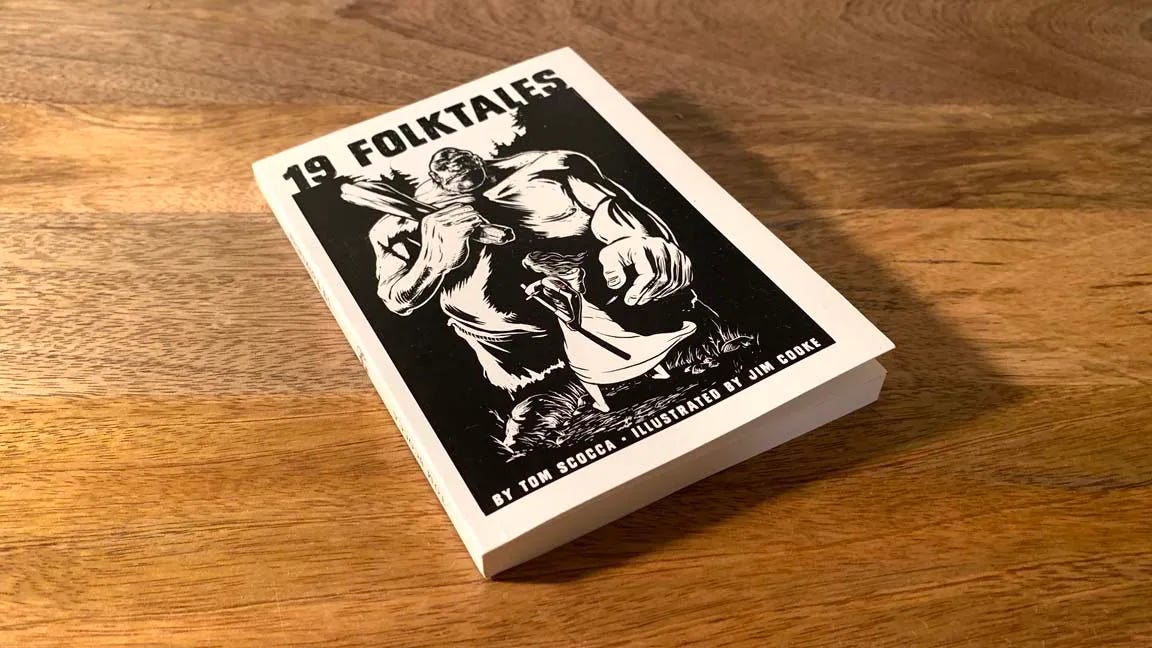
The second printing of 19 FOLK TALES is now available for belated Holiday gift-giving and personal perusal! Huddle up against the cold with a cozy collection of stories, each of which is concise enough to read within the snowy part of a wintry-mix storm.
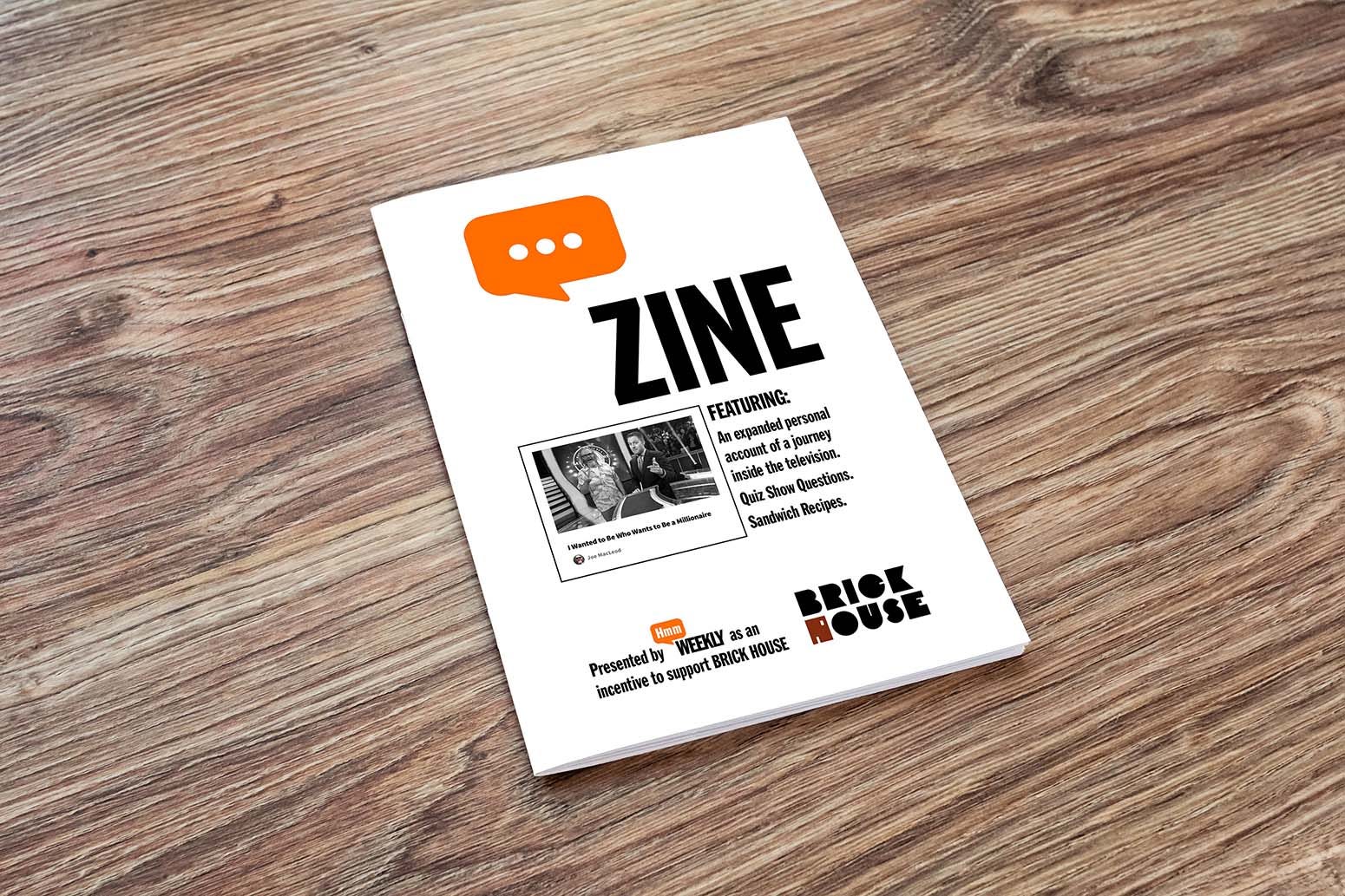
HMM WEEKLY MINI-ZINE, Subject: GAME SHOW, Joe MacLeod’s account of his Total Experience of a Journey Into Television, expanded from the original published account found here at Hmm Daily. The special MINI ZINE features other viewpoints related to an appearance on, at, and inside the teevee game show Who Wants to Be A Millionaire, available for purchase at SHOPULA.

FLAMING HYDRA will launch in January of 2024. The FLAMING HYDRA Holiday Preview Spectacular, a rich sampling of the writing and art you’ll enjoy as a subscriber to the forthcoming daily newsletter, is available now for your inspection. FLAMING HYDRA is the work of 60 world-class talents, but that’s just one reason to subscribe. FLAMING HYDRA is a 100% cooperatively owned, ad-free publication with no owners and no investors; just a bunch of writers and artists working together and splitting the proceeds equally.

INDIGNITY is a general-interest publication for a discerning and self-selected audience. We appreciate and depend on your support!





